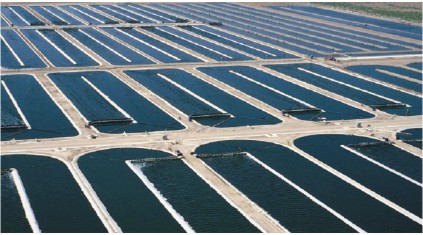A Green Goop Powered Future
Personally, I really like the idea of algal biofuels. Why? Well - the process is basically what humans have done for all of known history: farming. You take an organism which lives off sunlight, grow that. If you get all fancy, you can grow things that eat those things. Whooeeh.
Back to the green goop.
A little while ago I did research on algal fuels, because if they ever came to pass, they would have a big impact on the refining industry. And not just because of the obvious reason that they would eventually replace a lot of it, but because in the earlier stages they would have an economic impact on anything with concentrated CO2 emissions.
Because the two things the little buggers love are sunlight, and CO2. Yes, that nasty evil CO2 your neighborhood hippie has been telling you that you are killing the planet with. Every time someone gives me shit about my (hybrid...) Tahoe, I'll tell them that I am just feeding the trees...
Anyway, the last time the DOE gave algae a go, they thought it was just too expensive and not worth the time and effort. To date, there have been 0 successful commercial ventures, despite 60 years of effort. Now they are willing to try again, and have $35 million or so to spend. They think this time around, they can really get somewhere: crude oil prices are high, technology is making the world a better place, and a insane egomaniac with aNapoleon Lincoln Nixon Narcissus complex is in power.
You see - to make algae biofuels work, you have two options.
1) you make ponds in the shape of raceways and send the algae slowly going round, like riding the lazy river at the waterpark. Until after everyone has gotten big and fat and lazy, all the riders are squished up and turned into diesel.

2) A bioreactor. Sounds fancy. Really just means a closed system. The issue here is light, because, well, the bigger the tank the less light. So you end up with a whole crapton of tubes, which cost a crapton of money.

There are pros and cons to both of them, yadda yadda yadda. But they both have the same two big issues.
1) Other algae. You see - farm raised algae, just like all the animals we have genetically engineered such as cows and pigs, need to be big fat and juicy to make money. Docile helps a lot also. But unlike large animals, and even grains where weeds can be killed off (more on that in a minute...) there is a lot of natural algae just, well, around. Its basically like being unable to keep wild boars out of your pig pen. Regular, farm raised, fat and slow pigs just don't have a chance.

In open ponds, the solution has been to try and make your algae competitive with the natural stuff, and then just process a lot of it cheaply. In bioreactors, the solution is incredibly high levels of cleanliness, which usually ends up failing and the reactor gets taken over, and then it is impossible to clean out.

My solution - which is what people would not like to hear - is just genetically engineer the algae so that they can survive a certain algaecide, when all the natural ones can't. This is exactly what the US agribiz does with Roundup and its crops. Monsanto has it right (well - not sure I want to open that can of worms...) but we should be doing the same thing with algae.
And then we can produce all the damn CO2 that we want, and just pump it right back into big 'ol tanks of green goop, which wolf it down like grandma's leftover lasagna.
Did I just solve global warming and the energy crises in one fell swoop? Well, usually I like to be modest... but yes, I did.
Back to the green goop.
A little while ago I did research on algal fuels, because if they ever came to pass, they would have a big impact on the refining industry. And not just because of the obvious reason that they would eventually replace a lot of it, but because in the earlier stages they would have an economic impact on anything with concentrated CO2 emissions.
Because the two things the little buggers love are sunlight, and CO2. Yes, that nasty evil CO2 your neighborhood hippie has been telling you that you are killing the planet with. Every time someone gives me shit about my (hybrid...) Tahoe, I'll tell them that I am just feeding the trees...
Anyway, the last time the DOE gave algae a go, they thought it was just too expensive and not worth the time and effort. To date, there have been 0 successful commercial ventures, despite 60 years of effort. Now they are willing to try again, and have $35 million or so to spend. They think this time around, they can really get somewhere: crude oil prices are high, technology is making the world a better place, and a insane egomaniac with a
You see - to make algae biofuels work, you have two options.
1) you make ponds in the shape of raceways and send the algae slowly going round, like riding the lazy river at the waterpark. Until after everyone has gotten big and fat and lazy, all the riders are squished up and turned into diesel.

2) A bioreactor. Sounds fancy. Really just means a closed system. The issue here is light, because, well, the bigger the tank the less light. So you end up with a whole crapton of tubes, which cost a crapton of money.

There are pros and cons to both of them, yadda yadda yadda. But they both have the same two big issues.
1) Other algae. You see - farm raised algae, just like all the animals we have genetically engineered such as cows and pigs, need to be big fat and juicy to make money. Docile helps a lot also. But unlike large animals, and even grains where weeds can be killed off (more on that in a minute...) there is a lot of natural algae just, well, around. Its basically like being unable to keep wild boars out of your pig pen. Regular, farm raised, fat and slow pigs just don't have a chance.

In open ponds, the solution has been to try and make your algae competitive with the natural stuff, and then just process a lot of it cheaply. In bioreactors, the solution is incredibly high levels of cleanliness, which usually ends up failing and the reactor gets taken over, and then it is impossible to clean out.

My solution - which is what people would not like to hear - is just genetically engineer the algae so that they can survive a certain algaecide, when all the natural ones can't. This is exactly what the US agribiz does with Roundup and its crops. Monsanto has it right (well - not sure I want to open that can of worms...) but we should be doing the same thing with algae.
And then we can produce all the damn CO2 that we want, and just pump it right back into big 'ol tanks of green goop, which wolf it down like grandma's leftover lasagna.
Did I just solve global warming and the energy crises in one fell swoop? Well, usually I like to be modest... but yes, I did.
Comments
Post a Comment